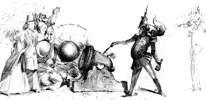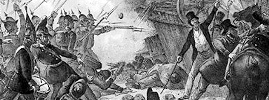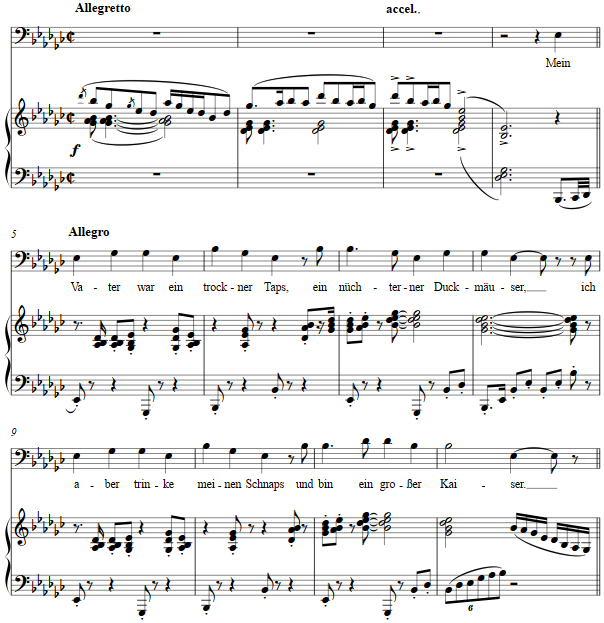Music and Texts of GARY BACHLUND
Vocal Music | Piano | Organ | Chamber Music | Orchestral | Articles and Commentary | Poems and Stories | Miscellany | FAQs
Der Kaiser von China - (2018)
Heinrich Heine
for baritone and piano
Heinrich Heine chose rhymed ridicule to paint an unflattering portrait of Frederick William IV Friedrich (1795-1861), the eldest son and successor of Frederick William III of Prussia, reigned as King of Prussia from 1840 to 1861. While the lessons of history are often forgotten, the series of revolutions throughout Europe beginning in 1848 were expressions of discontent with governments, heavy taxation alongside political censorship and repression. The demands, then as now, for freedom of the press, freedom of assembly, arming of the populace and elected parliaments, roiled many nations.
In what was to become a more unified Germany in time, the failing House of Hohenzollern struggled to continue, and ended up being on one side of the revolution and then the opposite, flirting with a citizens' constitution but dissolving a National Assembly in favor of a monarchist constitution, undercutting democratic forces. In Berlin lives were lost in this one of many European revolutions, as the detail of the graphic above illustrates, the "Kaiser" firing on his own people, as other artwork from the period record.
There is an additional irony to this for 2018 as one watches the European Commission act in similar ways with yet another elite dream of the "unification of Europe" quite like this King of Prussia's romanticist dream of a greater Holy Roman Empire, suggesting history's lessons instruct poorly. Heine had this sense in his metaphor of a "Kaiser" in China, as Prussian as the schnapps which flavors the imagery and recalls the view of many in that era of the King's propensity to drink. And as with governments across history, some many pays dearly with their lives that government may "better" them brutally.
The Kaiser of China
rhymed paraphrase of the composer.
Our father was a sober chap,
That common sort of conqueror,
We but swill our Prussian gin
And thus are the greater emperor.
This is a magic draught! We have
Decanted to our delight:
As soon as we have drunk it down
Blooms China, bloody, bright.
Our government is shot white hot
With fruiting-ripe prosperity,
Yet we, almost a manly man,
Find our pregnant wife's a scarcity.
There is plenteousness everywhere
And even our sick are healthy;
K'ung-zu, court councilor to us,
Speaks clearly for the wealthy.
Our military's pumpernickel
Shall be almond cake - hurray!
And all the tattered promenade
In velvet and silk display.
Our Clementine-skinned upper class,
And those dullards in this realm,
Will youthful vigor regain again
And praises then will overwhelm.
The great pagoda, spire inspired,
For believers is now complete;
Baptized Jews are rewarded
With medallions as a new elite.
A revolutionary spirit withers now
As did noble Manchu compute:
A constitution is not our wish,
We choose walking stick and stylish boot!
Asclepius, god's son, advised
We resist the evils of drink,
But we enjoy our Prussian gin
And our peoples are quite in the pink.
Another schnapps, and another schnapps!
It tastes like heaven's manna!
With the dregs our people shall be content
And cheer us loud: Hosanna!
Copyright © 2018 Gary Bachlund All international rights reserved.
The setting relies on the "black key" pentatonic scale, colored as sometimes rooted on E flat and later G flat, with "wrong-note" chord successions for spice. A variant of phrases from Haydn's hymn of 1797, "Gott erhalte Franz den Kaiser," which became known as "Das Lied der Deutschen," is stated as in measure 2 and several times thereafter. A folk-like and quite square, "Lumpen" melody captures the mood, as the ten strophes are treated as five sets of eight lines each. That monarchist patriotism should mix with a certain coarseness is hinted at in the music-hall style accompaniment, though this particular Kaiser is also known for the completion of the gothic cathedral in Cologne -- the "great pagoda" -- as well as many buildings in Berlin and Potsdam, and acting a patron to Mendelssohn and Schinkel. The form as the ten strophes are treated in sets of two is AABCA.
6 pages, circa 3' 30"
The score is available as a free PDF download, though any major commercial performance or recording of the work is prohibited without prior arrangement with the composer. Click on the graphic below for this art song score.


